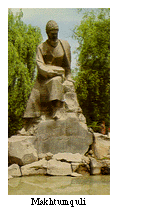
prepared by
Iraj Bashiri
copyright 1999
Turkmenian (pseud. Firaqi) poet, founder of classical Turkmen literature, was born circa 1730 in Qaraqal'a, in present-day Turkmenistan; he died in the 1780's, in Turkmenistan. Makhtumquli was the son of the poet Davlatmand Azadi, a Shahname reciter and a man of literature. At an early age, he studied the works of the great literary figures of the past, including Muslih al-Din Sa'di (1213-1292), Shams al-Din Hafiz (1321-1389), and Umar Khayyam (1021-1122) with his father. He then attended the Shirqazi school in Khiva, an experienced that he liked and documented in his verses. Later on, he traveled extensively in the Bukhara region, Afghanistan, Azerbaijan, and Iran. In Iran, he was captured and imprisoned, presumably on charges of spying. As a professional, Makhtumquli was an agriculturist, a silversmith, and a leather maker. As a literary figure, he was a revolutionary poet and a novelist. Unfortunately, only a small number, between 5,000 and 10,000 bayts, of his poetry have survived. The rest have been destroyed either in the recurrent invasions of his homeland or in destruction resulting from inter-tribal strife.
Makhtumquli's poetic career began early in his life with the memorization of the works of the masters and with recounting prevalent Turkmanian stories. In fact, he was heir to the legacy of Mahmud Kashghari (893-990), the tenth-century author of the Divan-i Lught-i Turk and to the epic Kor-ogly, the foundation of Turkmenian national liberation. Like most learned men of Central Asia, Makhtumquli was fluent in Persian and Tajiki. He used the Arabic alphabet for writing and the Arabic meters for composing his verses. He might even be the first Turkmenian poet to use the Arabic meters in verse. An avid reader of the contributions of his predecessors, Makhtumquli not only translated the Ruba'iyyat of Umar Khayyam into his own language but wrote quatrains of his own following the example of Khayyam, thematically as well as structurally. He even introduced innovations into Turkmenian literature based on the works of other well-known Persian-speaking poets, including Sa'di and Jalal al-Din Rumi (1207-1273).
A major theme of Makhtumquli's poetry is old age. Composed at different stages of his life, "My Life Flies Away," "Nothing Remains," "Lament on Old Age," "What Use This Transient World," and "I Weep" depict a poet who is much pained by the vagaries of Time. Another related theme, lament, is incorporated in elegies, like "Separated," composed on the death of his beloved Mengli and "Afflicted" composed after the death of a beloved child. The loss of his brother is mourned in a most touching poem entitled, "Abdullah." Still a third major theme deals with virtues, like "Generosity" and vices, like "Desire." To the last category belong three poems on the subject of drugs addressed to the youth. These pieces entitled "Chilim" (The Hooka), "Chilimkash" (The Hooka Smoker), and "Noskash" (The Nos Smoker) are self-explanatory. Nos, it should be mentioned, is a drug derived from a plant called by the same name, specific to the southern regions of Centrtal Asia.
Makhtumquli is a people's poet. Many of his verses, transformed into proverbs, are used in daily conversations by ordinary people. In this regard, it can be said that he has bridged the gap between the literary and the spoken modes of Turkmenian literature. The patriotic themes of Makhtumquli's poetry, including renovation of the country and creation of unity and brotherhood among the disparate Turkmenian tribes stand in contrast to his love poems, laments, and elegies.
Makhtumquli loved his homeland and the Turkmen people. In his early verses, he was an optimist, convinced that the difficulties facing his people would be overcome. But by the time he turned forty, having witnessed the same difficulties in other lands he had visited, he became a fatalist. This, however, did not discount the role of human beings in their own affairs. There are many examples of unjust and unprincipled muftis, ishans, and governmental officials in his poetry. "Taking Flight" is a good example of Makhtumquli's reaction to such oppressive individuals.
Over the past 200 years, Makhtumquli's sweet lyrics have traveled from aul to aul, spereading myrth and joy among the Turkmenian people. In the middle of the 19th century, Makhtumquli's contributions were given a new life by Mollanepes (circa 1810-62) who, like Myatadshi (1824-1884) who followed him, rose agaist the despotism of the rulers. The greatest boost to Makhtumquli's international recognition, however, occured after the October Revolution, when Turkmenistan achieved republic status.
Like Abdulhekim Qulmuhammed, Makhtumquli spoke up against oppression at a time when other poets, especially those benefiting from the Amirs' largesse, chose silence. He also understood calamity, suffering and pain, a daily preoccupation of his people in the harsh Turkmenian desert. In time, his bold stance against oppression along with his idealism, patriotism, and benevolence affected his countrymen. Today, among the Turkmenian poets, painters, and intellectuals, he is recalled as the most cherished symbol of liberation.
FURTHER WORKS: Saylanan Eserler, Vols. 1-2, (1959)
BIBLIOGRAPY: Karryev, B. A., Makhtumquli ve onig vatanchiligi (1943); Abramova, F. Sh., Makhtumquli (Fragi), 225 let so dnia rozhdennia: Ukazatel' literatury (1959); She'rha-i Muntakhab (trans. M. Aminzada), (1959); Junger, Harri (ed), The Literatures of the Soviet Peoples: A Historical and Bibliographical Survey (1970), pp. 83-86, 299-300; Kor-Ogly, Kh., Turkmenskaia Literatura (1972); Karryev, B. A., "M.," Great Soviet Encyclopeia, 3rd ed. [Eng. tr.], Vol. 15 (1977), pp. 344-345; Ensaiklopidiaye soveti-i Tojik, Vol. 4 (1983), 275; Ensaiklopedia-i Adabiyyat va San'at-i Tajik, Vol. 2 (1989), 191; Allworth, E., "The Focus on Literature," in Allworth, E., ed., Central Asia: 120 Years of Russian Rule (1989), p. 407.